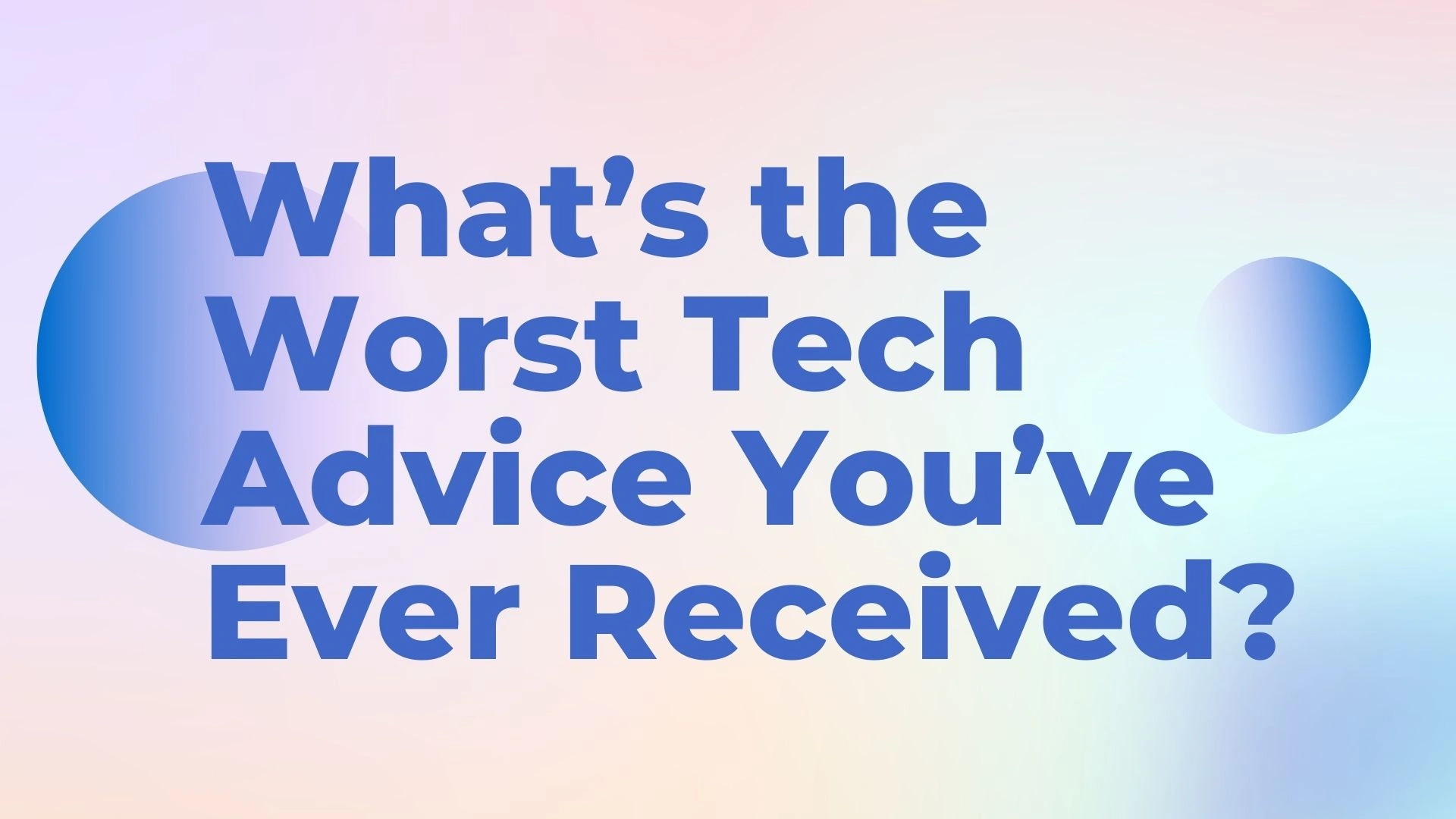What’s the Worst Tech Advice You’ve Ever Received?
We’ve all been there someone confidently gives us a “pro tip” about technology, and it turns out to be complete nonsense. Maybe it was a tech-savvy friend, an outdated guide, or a stranger on the internet claiming to be an expert. Either way, bad tech advice can lead to frustration, wasted money, and even security risks.
So, let’s take a trip down memory lane and go over some of the worst tech advice people have ever received and why you should never follow it.
1. “You Should Always Drain Your Battery to 0% Before Charging”
Why It’s Wrong:
This might have been true for old nickel-cadmium (NiCd) batteries, but modern lithium-ion (Li-Ion) batteries don’t work that way. Draining your battery to 0% frequently can actually shorten its lifespan.
What You Should Do Instead:
- Keep your battery between 20-80% for the best lifespan.
- Use official chargers to prevent overheating.
2. “More RAM Will Always Make Your Computer Faster”
Why It’s Wrong:
Adding RAM can help, but only if your system actually needs more memory. If your computer already has enough RAM (say 16GB for general use), adding more won’t magically make it faster—it just sits unused.
What You Should Do Instead:
- If your PC is slow, check for bottlenecks like an old HDD, outdated CPU, or software issues.
- Upgrade to an SSD instead of just adding RAM—it makes a bigger difference in performance.
3. “Macs Don’t Get Viruses”
Why It’s Wrong:
While macOS is more secure than Windows due to its closed ecosystem, it’s not immune to viruses or malware. Cybercriminals have adapted, and Macs are now targeted just like Windows PCs.
What You Should Do Instead:
- Always install updates to patch security vulnerabilities.
- Use antivirus software, even on a Mac.
4. “Using Incognito Mode Makes You Anonymous”
Why It’s Wrong:
Incognito mode only prevents your browsing history from being saved on your device—it doesn’t hide your activity from websites, your internet provider, or hackers.
What You Should Do Instead:
- Use a VPN if you want more privacy.
- Install browser extensions that block trackers.
5. “You Should Defragment Your SSD Regularly”
Why It’s Wrong:
Defragmenting a solid-state drive (SSD) does nothing beneficial—and it can actually reduce its lifespan since SSDs have limited write cycles.
What You Should Do Instead:
- NEVER defrag an SSD—let Windows automatically optimize it.
- Enable TRIM support to maintain SSD performance.
6. “You Don’t Need to Back Up Your Data—Cloud Storage Is Enough”
Why It’s Wrong:
Cloud storage is convenient, but it’s not a true backup solution. Accounts get hacked, files get deleted, and sometimes services shut down.
What You Should Do Instead:
- Follow the 3-2-1 backup rule:
✅ Keep 3 copies of your data
✅ Store it on 2 different types of storage (HDD, SSD, cloud, external drive, etc.)
✅ Keep 1 copy offsite (e.g., cloud storage or another location)
7. “Turning Off Your Computer Every Night Is Bad for It”
Why It’s Wrong:
This was a thing with older computers, but modern devices are designed to handle frequent shutdowns. Leaving your computer on all the time can actually increase wear and tear.
What You Should Do Instead:
- Restart your PC regularly to refresh system processes.
- Shut it down when you won’t be using it for extended periods.
8. “Free Antivirus Is Just as Good as Paid Antivirus”
Why It’s Wrong:
While some free antivirus programs offer basic protection, they often come with ads, missing features, or slower updates. Some even sell your data!
What You Should Do Instead:
- Use Windows Defender if you need a free, reliable option.
- Invest in a reputable paid antivirus if you need extra protection.
9. “You Should Always Use Third-Party Cleaning Apps”
Why It’s Wrong:
Many so-called “PC cleaners” claim to boost performance, but most just delete cache files and registry entries—something your system already does on its own. Some even come with malware or bloatware.
What You Should Do Instead:
- Use Windows’ built-in Disk Cleanup tool.
- Uninstall programs manually instead of using third-party “cleaners.”
10. “More Megapixels Mean a Better Camera”
Why It’s Wrong:
Megapixels are only one factor in camera quality. Other things—like sensor size, lens quality, and image processing—matter way more.
What You Should Do Instead:
- Look at real-world photos, not just megapixel count.
- Pay attention to low-light performance and lens quality.
Final Thoughts: Don’t Believe Everything You Hear!
Tech evolves fast, and bad advice spreads even faster. Whether it’s an outdated tip or a total myth, following the wrong advice can hurt your devices, data, and security. Always do your own research, check reliable sources, and think twice before following sketchy tech tips!
FAQs
1. What’s the worst tech advice someone has ever given you?
Some of the worst advice includes “Macs don’t get viruses”, “Incognito mode makes you anonymous”, and “Defragment your SSD”—all of which are myths.
2. Is it bad to charge my phone overnight?
No, most modern smartphones have battery management features that prevent overcharging. However, keeping it plugged in at 100% for long periods can reduce battery lifespan over time.
3. Should I pay for an antivirus program?
It depends! Windows Defender is enough for most users, but a paid antivirus can provide extra security features like ransomware protection.
4. Is clearing my cache bad for my phone or PC?
No, clearing the cache frees up space and can fix issues. However, doing it too often might slow down your apps because they have to rebuild cache files.
5. Are software updates really necessary?
Yes! Updates fix security vulnerabilities and improve system performance. Skipping updates can leave your device exposed to hacks and malware.
So, what’s the worst tech advice you’ve ever received? Drop your stories in the comments!
worst tech advice, bad tech tips, common tech myths, worst computer advice, bad tech recommendations, tech mistakes to avoid, bad technology habits, tech myths debunked, worst IT advice, tech troubleshooting mistakes, funny tech fails, IT myths debunked, bad tech recommendations, worst computer tips




